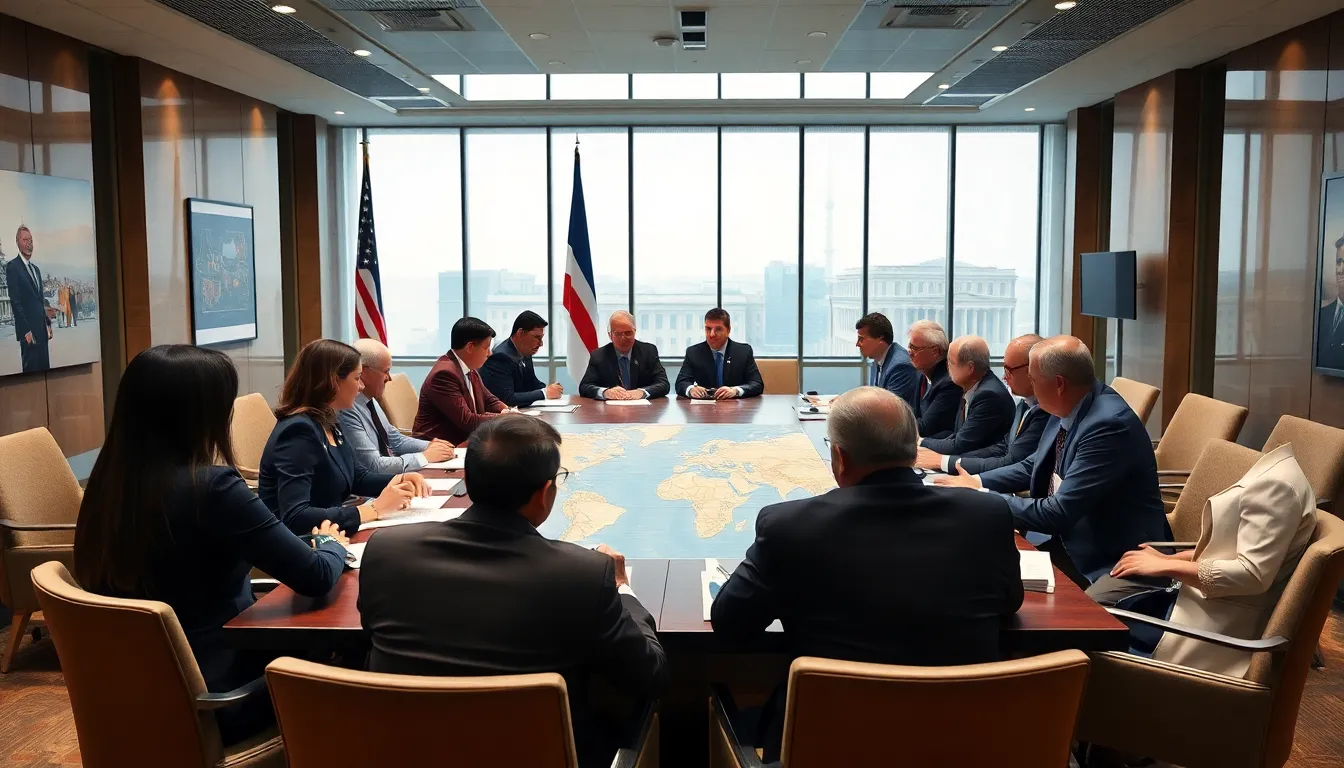Navigating the world of international relations can feel like trying to solve a Rubik’s Cube blindfolded. With countries acting like teenagers in a food fight, understanding the essentials becomes crucial for anyone who wants to avoid diplomatic disaster. From treaties to trade agreements, the intricacies of global interactions shape everything from local economies to international peace.
But don’t worry; it’s not all doom and gloom! Delving into international relations can be as exciting as binge-watching a political thriller, minus the popcorn. Grasping the fundamentals equips one with the tools to decode the complex web of alliances and rivalries that define our world today. So buckle up and get ready to explore the essentials of international relations—because who wouldn’t want to impress friends with their newfound geopolitical savvy?
Table of Contents
ToggleOverview of International Relations
International relations encompass the interactions among states and non-state actors on the global stage. Understanding this field reveals its significance in shaping global policies, economic strategies, and social dynamics.
Definition and Importance
International relations involves the study of how nations interact, including their diplomatic, economic, and military relationships. Its importance lies in fostering peace, promoting cooperation, and addressing global challenges. The discipline helps analysts interpret conflicts and develop strategies for resolution. Engaging in international relations allows better comprehension of treaties and trade agreements, which heavily influence both local economies and international stability. Moreover, the study prepares individuals to navigate complex geopolitical landscapes and understand the factors driving global relations. Scholars and policymakers alike rely on these insights to make informed decisions.
Key Theories in International Relations
Several key theories underpin the study of international relations. Realism emphasizes power and national interest as central to state behavior. Idealism, in contrast, focuses on international law, morality, and global governance structures. Constructivism addresses the role of ideas, beliefs, and identities in shaping international interactions. Each theory offers distinct perspectives that influence diplomatic strategies and global policies. Understanding these theories equips individuals to analyze current events within a broader theoretical framework. They provide tools to assess how various factors, including culture and ideology, complicate international dynamics.
Major Concepts in International Relations

The study of international relations revolves around several crucial concepts that shape interactions among nations.
Sovereignty and Statehood
Sovereignty refers to the authority of a state to govern itself without external interference. It serves as a fundamental principle in international law, shaping the notion of statehood. Each country maintains its own sovereignty, which defines territorial integrity and political autonomy. States engage in recognition of one another to validate their sovereignty. The ability of a state to enter treaties and participate in global organizations derives from this recognition. Non-state actors, such as multinational corporations and international organizations, also influence statehood but operate within the framework established by sovereign states. Sovereignty remains vital for maintaining order in international relations and addressing global challenges collaboratively.
Power and Diplomacy
Power manifests in various forms within international relations, influencing diplomatic strategies. Military power, economic influence, and soft power shape the dynamics of global interactions. A state’s ability to project power impacts its position in international negotiations. Diplomacy serves as the primary tool for managing relationships between countries. It ranges from formal negotiations to informal interactions, playing a crucial role in conflict resolution and strengthening alliances. Nations utilize diplomatic channels to advocate their interests while maintaining stable relations. Balancing power and diplomacy is essential in addressing global issues and ensuring peace among nations. Different forms of power create diverse diplomatic approaches, reflecting the complexity of international relations.
Actors in International Relations
International relations involve a variety of key actors that shape global interactions. These actors include nation-states, international organizations, and non-state actors, each playing distinct and significant roles.
Nation-States
Nation-states serve as the primary actors in international relations. They wield sovereignty, allowing them to govern themselves without external interference. Through diplomacy, they engage in treaties that can foster alliances and trade agreements. More than just geographic boundaries, nation-states represent the collective interests of their citizens. Each nation-state maintains its military and economic power, influencing global politics. Examples include the United States, China, and Russia, which assert their influence in various regions.
International Organizations
International organizations facilitate cooperation among nation-states. Bodies such as the United Nations and the World Trade Organization promote dialogue, security, and economic collaboration. These organizations create frameworks for addressing global challenges like climate change and humanitarian crises. They often mediate disputes, ensuring that member states adhere to international laws and norms. Various treaties emerge from these interactions, bolstering collective security efforts and economic partnerships between nations.
Non-State Actors
Non-state actors contribute significantly to the dynamics of international relations. These actors range from multinational corporations to non-governmental organizations (NGOs). They advocate for various causes, including human rights and environmental sustainability. Many non-state actors influence public policy and international norms through advocacy and funding. They often fill gaps in humanitarian assistance where nation-states may fall short. Prominent examples include Amnesty International and major corporations like Google and ExxonMobil.
Challenges in International Relations
International relations face several significant challenges that affect global stability and cooperation. Understanding these challenges helps individuals navigate the intricate world of diplomacy and conflict resolution.
Global Conflicts
Conflicts among nations often arise from power struggles, territorial disputes, and cultural differences. Historical grievances can intensify tensions, making resolution difficult. For example, the ongoing conflicts in the Middle East exemplify how deep-rooted issues complicate peace efforts. Furthermore, regional conflicts can escalate, drawing in external powers and creating broader implications. The rise of nationalism in various countries fuels these tensions, challenging established alliances and diplomatic norms. Resolving these conflicts requires skillful diplomacy and a willingness to engage in constructive dialogue.
Economic Interdependence
Economic interdependence presents both opportunities and challenges in international relations. Trade agreements, global supply chains, and financial markets connect countries. Disruptions in one economy can ripple through others, demonstrating the importance of cooperation. For instance, the COVID-19 pandemic highlighted vulnerabilities in global trade networks. Protecting national interests can sometimes conflict with the need for collaboration, creating friction among states. Countries benefiting from global trade must address economic disparities while fostering inclusive growth. Managing these complexities requires a delicate balance between competition and collaboration on the international stage.
Mastering the essentials of international relations equips individuals to navigate a complex world. Understanding the interplay of treaties diplomacy and the roles of various actors fosters a deeper comprehension of global dynamics. This knowledge empowers readers to analyze current events critically and appreciate the intricacies of international cooperation and conflict.
As global challenges continue to evolve the ability to interpret these dynamics will become increasingly vital. Engaging with the theories and concepts discussed not only enhances awareness but also prepares individuals to contribute meaningfully to discussions about peace and cooperation. With a solid foundation in international relations anyone can become an informed participant in shaping the future of global interactions.





